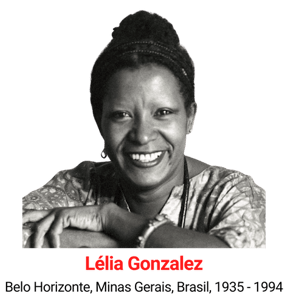

Lélia Gonzalez was a pioneering intellectual whose contributions to the field of Social Sciences have only recently started to be fully acknowledged and valued in Brazil and abroad. Despite her popular, Black and Indigenous background, she studied in the most important and prestigious public schools of the former capital of Brazil, Rio de Janeiro. Lélia Gonzalez's educational background was solid. She did her secondary studies at the renowned Colégio Pedro II and soon after went to the University of Guanabara, now the State University of Rio de Janeiro. At this institution, she obtained strong training in the humanities, especially in the areas of Philosophy and History. In the 1970s, she would dedicate herself to studies in the Social Sciences, especially Sociology, Anthropology, and Psychoanalysis.
As an intellectual and activist, Gonzalez participated in numerous forms of political resistance to the military regime (1964–1985), for which she was guarded by the Department of Political and Social Order, the DOPS. She was a founder of the Unified Black Movement, was in the formation of the Workers' Party (PT), and participated actively in the 1982 elections when she ran for state deputy. She was active in the Brazilian civil mobilizations against Apartheid in South Africa, founded the organization Nzinga: Coletivo de Mulheres Negras (Black Women's Collective) in 1983, and participated in numerous feminist and Black women's meetings in Brazil and other parts of the world.
Excerpt from RIOS, F. (2021). Notes on the Essay Racism and Sexism in Brazilian Culture. WSQ: Women's Studies Quarterly 49, 395-406. Online
Further reading:
GONZALEZ, L. (1988). For an Afro-Latin-American Feminism. Feminist Archives. Online
RATTS, A.; RIOS, F. (2010). Lélia Gonzalez. São Paulo: Selo Negro, 2010. PDF
Main publications:
1978. Qual o lugar da mulher negra na força de trabalho? Rio de Janeiro: Instituto Universitário de Pesquisa do Estado do Rio de Janeiro (Iuperj).
1979. Cultura, etnicidade e trabalho: efeitos linguísticos e políticos da exploração da mulher. In: Annual Meeting of the Latin American Studies Association. Pittsburgh, 5-7.
1979. A juventude negra brasileira e a questão do desemprego. In: Annual Meeting of the African Heritage Studies Association. Pittsburgh, 26-29 abr.
1979. A mulher negra na sociedade brasileira. In: Spring Symposium the Political Economy of the Black World. Los Angeles.
1979. Racism and its Effects in Brazilian Society. In: Conferência Mundial das Mulheres sobre Direitos Humanos e Missão. Veneza, 24-30 jun.
1980. The Unified Black Movement. In: Symposium on Race and Class in Brazil: New Issues and Approaches. Center for Afro-American Studies, UCLA, Los Angeles, 28 fev./1 mar.
1982. GONZALEZ , L.; HASENBALG , C. Lugar de negro. Rio de Janeiro: Marco Zero.
1982. A mulher negra na sociedade brasileira: Uma abordagem político-econômica. In: LUIZ, Madel (Org.). Lugar da mulher: Estudos sobre a condição feminina na sociedade atual. Rio de Janeiro: Graal, pp. 87-106. (Coleção Tendências).
1983. Racismo e sexismo na cultura brasileira. In: Movimentos sociais urbanos, minorias étnicas e outros estudos. Brasília: Anpocs, 1983. (Ciências Sociais Hoje, n. 2).
1983. Mulher negra e participação. In: III Congresso Internacional da Associação Latino-Americana de Estudos Afro-Asiáticos, Rio de Janeiro, 1-5 ago.
1984. The Black Woman’s Place in Brazilian Society. In: 1985 and Beyond: A National Conference. African American Political Caucus/Morgan State University, Baltimore, 9-12 ago.
1985. The Unified Black Movement: A New Stage in Black Political Mobilization. In: FONTAINE , Pierre- Michel (Org.). Race, Class, and Power in Brazil. Los Angeles: Universidade da Califórnia, Center for Afro-American Studies, pp. 120-34.
1985. The Black Woman Place in the Brazilian Society. Afrodiáspora, Rio de Janeiro, ano 3, n. 6-7, pp. 94-106, abr./dez.
1988. Por un feminismo afro-latino-americano. Isis Internacional — Mujeres por um desarollo alternativo, Santiago, v. 9, pp. 133-41, jun.
1988. Nanny: pilar da amefricanidade. Revista Humanidades, Brasília: Ed. UnB, ano IV , n. 17, pp. 23- 5.
1988. A socio-historic study of South American Christianity: the Brazilian case. In: First Pan- African Christian Churches Conference, International Theological Center. Atlanta, 17-23 jul.
1994. Lélia fala de Lélia. Revista Estudos Feministas, Rio de Janeiro, v. 2, n. 2, p. 383-386. Online
2018. Lélia Gonzalez: Primavera para as rosas negras. São Paulo: UCPA.
2020. Por um feminismo afro-latino-americano: ensaios, intervenções e diálogos. Rio de Janeiro: Zahar, organizado por Flávia Rios e Márcia Lima.
